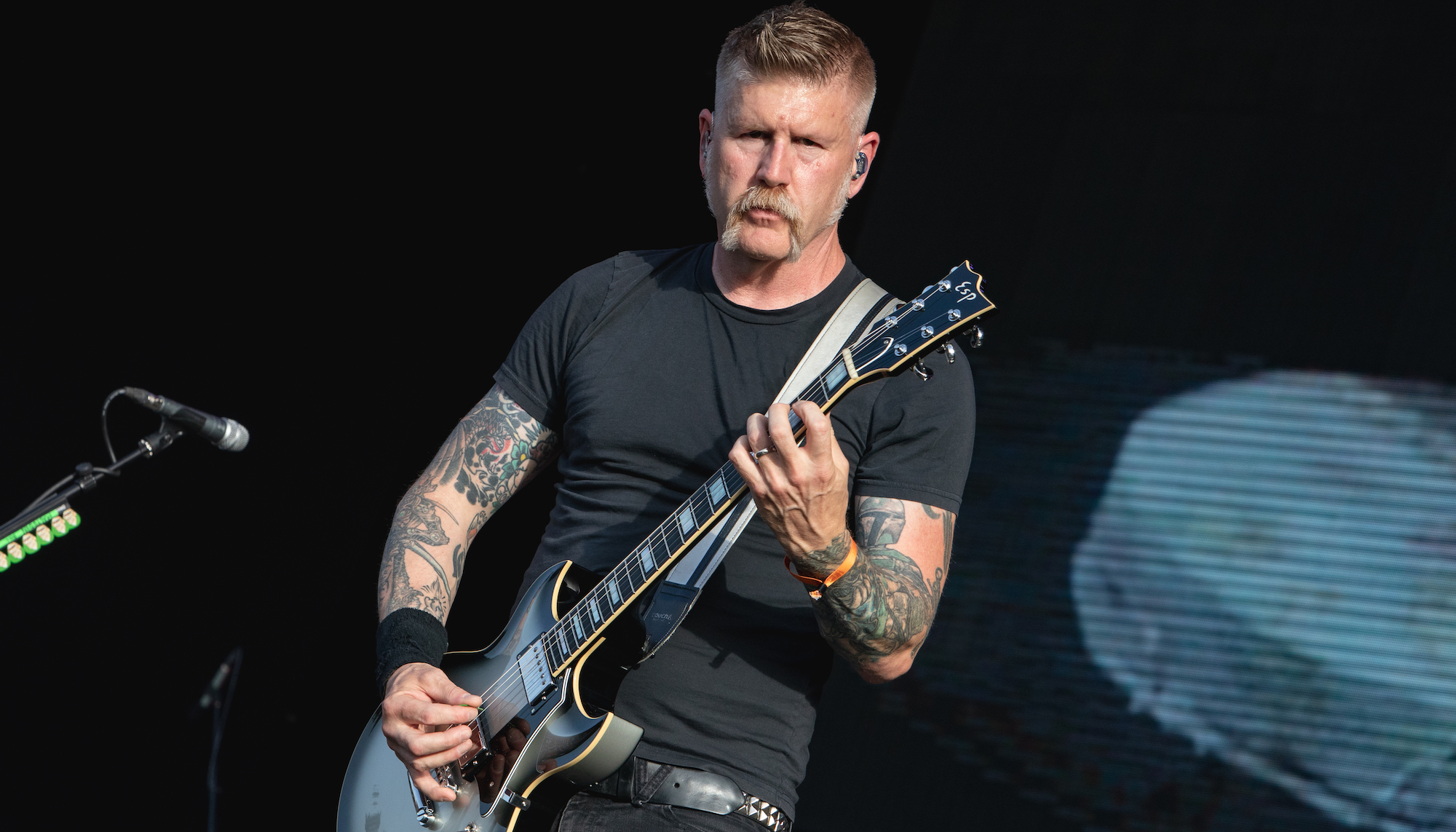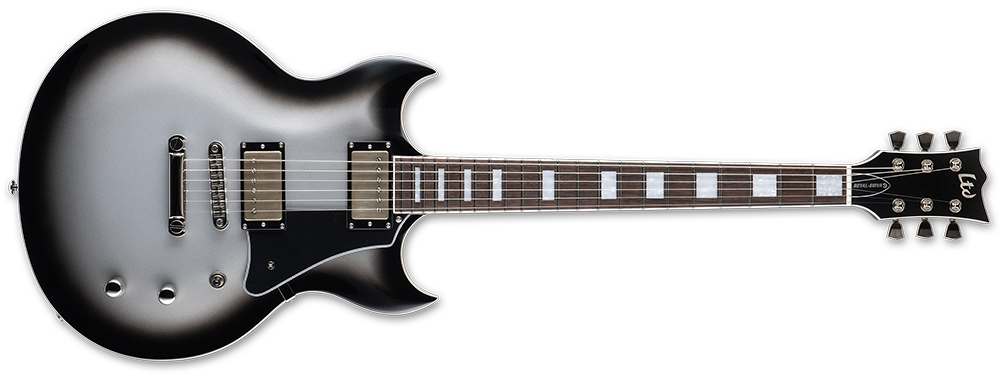“It’s heavy, thick and unique. It feels great, and the neck is incredible. And it’s heavy; but that’s okay because the weight of a guitar is very important to me. The thicker the better”: If you pick up Bill Kelliher’s new ESP guitar, you’ll know about it
The Mastodon guitarist – who aims to write simpler songs for the band's next album – had his favorite 9-string mapped and mutated into the LTD Silver Sunburst Royal Shiva

In 2021, Mastadon released its most ambitious record yet, the 86-minute epic Hushed and Grim. At its core was the same depth and power we've come to expect from the supercharged, hard-riffing duo of Brent Hinds and Bill Kelliher.
Few rock harder and heavier the the pair, who are often labeled as lead and rhythm respectively. Across the band’s eight-record catalog, which includes the classics Leviathan (2004), Crack the Skye (2009), and Once More 'Round the Sun (2014), Hinds’ leads are surely searing – but it’s Kelliher’s soul-filled approach that’s defined Mastodon most.
“We’re opposite sometimes,” Kelliher tells Guitar World. “When I write songs I’ll spend months piecing them together, whereas Brent says, ‘Let’s jam and write whatever on the spot in the studio.’ That sometimes works for me, but I generally want to be organized and try out every possible avenue of where the songs can go.”
He reports that he’s already working on riffs for the next Mastodon record. “I’m feeling really good about everything because I have a lot of ideas. But my ideas always sound homogenous at first, so I have to trust my instincts that they’ll get to a point where they actually sound different. It’s baby steps right now, especially coming off a grand double album.
“I want to get back to songs more like Pushing the Tides, where the songwriting is very guitar-driven. We don’t do simpler stuff that much; there's a lot of 10 and 15-minute songs in our catalog. And that’s cool – they’re great and I love to play them. But that’s not the trip I’m on now. I’ve been tuning to Drop C a lot, so we’ll see where that takes me.”

Your latest ESP signature guitar, the Silver Sunburst Royal Shiva, dropped ahead of NAMM. What was the inspiration behind it?
“For Crack the Skye back in 2009, I wanted a guitar with nine strings, with three high strings doubled up. Back then, my guitar was by First Act, a custom double cutaway; I really liked the way it sounded and played. I also liked the weight of it, which was maybe 12 or 13 pounds – it was really thick.
Get The Pick Newsletter
All the latest guitar news, interviews, lessons, reviews, deals and more, direct to your inbox!
“Fast-forward to around 2020 and I was like, ‘Man, I’d like to have a guitar like that, but with only six strings.’ I just wanted something I could play, so I worked with ESP to make one just like it, only with six strings.
“I sent them the First Act guitar, and they sent it to Japan to have all the specs mapped out, aside from the original nine strings. They basically made an exact copy of it, and I love it.
“It’s heavy, thick and unique. It feels great, and the neck is incredible. And it’s heavy; but that’s okay because the weight of a guitar is very important to me. The thicker the better.”
Why do you prefer such heavy guitars?
“I don't know… I don’t trust a light guitar! Well, I shouldn't say that – it’s more that I like a guitar that feels solid. I know I’m getting older, and running around the stage with such heavy guitars isn’t great for my back and shoulders, but I like ‘em heavy.
“I tried SGs and Flying Vs, and they might look cool and sound good, but it’s like playing a piece of Styrofoam.”
One of the prettiest features of the Royal Shiva is the double cutout, which gives you plenty of access.
“I don’t play a lot of stuff up high, but there are definitely some benefits to being able to play up there. And you definitely can with this guitar.”
What sets ESP apart for you?
“I like the fact that fresh out of the box, they’re in tune and intonated well – they’re ready to go right away. Honestly, I never really have to set them up. When ESP sends one to me – which they do often because they’re such a great company – they’re always what I need.
“I was never a big fan of weird, crazy metal-shaped guitars with spikey ends and stuff like that. When I joined up with ESP the first thing I said was, ‘Can I design my own guitar?’ Literally, the first couple of prototypes were on the mark. ESP just makes good products; even the LTDs are fucking great out of the box.”
Are the pickups singular to you?
“Yeah – they’re called Hellbenders, which is derived from an old song. I started working with Mojotone because they’re a small company, not too far from where I live, and had been sending me pickups for years. I always loved them and said, ‘Man, these are sleepers. These are great pickups.’
I’m not trying to be a precise player, but I’m always trying to maintain a sense of soul
“So when it came time to move on from my old endorsement and I needed pickups, I called Mojotone, and they sent me a bunch to try out. I liked their Black Magic pickup because of the sharpness and clarity, and I could catch all these attributes with just that one pickup.
“I like pickups with a bit more mid-range and high-end because the Freidman Butterslax amps I use are very bass-heavy. I needed to pick up each string equally. I need that mid-range because even my clean tone has dirt and grit with some sustain.”
Are the Hellbenders custom wound to your specification, or a direct offshoot of the Black Magic series?
“They’re a bit of both. I might have even sent them some other pickups by other companies and said, ‘I like the responsiveness of this.’ But they’ve told me the Hellbenders are specific to me – even though I don’t know all the specifics!
“There’s some alnico and ceramic mumbo jumbo that I don’t fully understand, but my ears tell me they sound great. We went through five or six prototypes before settling on what’s in the Royal Shiva.”
You mentioned your Friedman amps, which were considered while putting together the Royal Shiva. What’s the secret sauce in your current combination of amps, pickups and guitars?
“The secret sauce is clarity. I’m not trying to be a precise player, but I’m always trying to maintain a sense of soul. Growing up, I never took lessons; I listened to bands like The Ramones and Black Flag, which were a little sloppy. All those guys were writing songs, and they weren’t Berklee School of Music guys – they were just playing fucking power chords. They were a little sloppy, kinda like Jimmy Page and Jimi Hendrix.
“So when choosing amps to pair with this stuff, I look for crunchy, chewy, soggy and crisp tones. A lot of people use too much distortion and scoop out the mid-range – the older I get, the less distortion I want from my amps.”
Some riffs have to wait years for their time to come out to play. That’s how it's always been
So the Hellbenders on the Royal Shiva allow you to drive the amp harder and create distortion through breakup, rather than relying on pedals?
“Yeah, because I use high-gain amps. They’re very tight, with a lot of bottom end. But I’ve also incorporated some Victory VX100 Super Krakens. The mixture gives a wall of sound that has enough bass and low end through the Freidman.
“And then I get a lot of high-end from the Victory. It’s crisp – if you were playing speed metal and speed picking, you’d be able to hear each note. The combination of those two amps gives me a sound that’s unique to me.”
Have you put that setup to work in writing some new riffs for Mastodon’s next record?
“Oh, yeah, definitely. But how it’ll all sound has yet to be determined. It’s always hard to see the forest through the trees, so to speak. Until vocals start happening, it’s just a bunch of big riffs that are weird and off-time. It’s a lot of weird shit that needs to be pieced together, but that’s the process.
“I’ll record a bunch of riffs while on tour and put them on my phone. Once we’re off tour I’ll dump them out and see which ideas can be friends. It’s rare for me to sit down and write an entire song in one sitting.
“What makes Mastodon songs unique is that one riff could be from 12 years ago and paired with a riff I just wrote. Some riffs have to wait years for their time to come out to play. That’s how it's always been.”
Will the Royal Shiva make its recording debut on the next record?
“Definitely. I feel like the thicker the guitar, the better. That guitar is thick, and it resonates better than others. So I’ll use that for sure – but there will be others.
“When tracking I like to use a guitar with a humbucker, like a Les Paul or the ESP, and then I’ll double it with a guitar by ESP, an LTD called the Ron Wood. It has a single coil, bringing the overall guitar tone out to me.”
You're in the early stages of writing, but what’s next for Mastodon?
“Hopefully we’ll be touring at some point in 2024. But for sure, it’s record-writing time, so that’s what I’m focusing on right now. I did a lot of traveling in 2023, so I just want to sit at home, dig in, and write the best record we can write. The goal is always to top the last one.”
- Hushed and Grim is on sale now. Watch the Mastodon website for tour dates.
Andrew Daly is an iced-coffee-addicted, oddball Telecaster-playing, alfredo pasta-loving journalist from Long Island, NY, who, in addition to being a contributing writer for Guitar World, scribes for Bass Player, Guitar Player, Guitarist, and MusicRadar. Andrew has interviewed favorites like Ace Frehley, Johnny Marr, Vito Bratta, Bruce Kulick, Joe Perry, Brad Whitford, Tom Morello, Rich Robinson, and Paul Stanley, while his all-time favorite (rhythm player), Keith Richards, continues to elude him.
“I was writing songs from eight years old, but once I got a guitar I began to deeply identify with music… building an arsenal of influences”: How Lea Thomas uses guitars her dad built to conjure a magic synthesis of folk, pop and the ethereal
“I liked that they were the underdogs. It was not the mainstream guitar. It was something that was hard to find”: Vox guitars deserve a second look – just ask L.A. Witch’s Sade Sanchez, who’s teaming hers with ugly pedals for nouveau garage rock thrills










